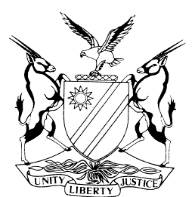3
REPUBLIC OF NAMIBIA

IN THE HIGH COURT OF NAMIBIA, MAIN DIVISION, WINDHOEK
REVIEW JUDGMENT
Case Title: The State v Nathan Esau | CR 70/2022 | |
High Court MD Review No: 1052/2022 | Division of Court: Main Division | |
Heard before: Judge Usiku and Judge January | Delivered on: 02 August 2022 | |
Neutral citation: S v Esau (CR 70/2022) [2022] NAHCMD 386 (02 August 2022) | ||
The order:
| ||
Reasons for order: | ||
JANUARY J (USIKU J concurring) [1] This matter was sent for special review by the Divisional Magistrate of Keetmanshoop in terms of s 304(4) of the Criminal Procedure Act 51 of 1977, as amended (the CPA). Attached to it was a letter wherein the magistrate requests the reviewing court to set aside the s 174 discharge of the accused due to an irregularity described as a stopping of prosecution. [2] The accused persons in the matter were charged with the offence of robbery with aggravating circumstances as defined in s 1 of the CPA. It is alleged that on the 19th day of December 2020, the accused did wrongfully, unlawfully and with intention of forcing him into submission assault or threaten to assault Patricio Draaier by chasing him with a knife and taking from him a back pack and three litres of sweet rose wine, with a value of N$250, and which were the property of or in the lawful possession of the said Patricio Draaier; and that aggravating circumstances as defined in s 1 of Act 51 of 1977 were present; in that the accused was before, after or during the commission of the crime in possession of a dangerous weapon, to wit a knife. [3] The accused pleaded not guilty on the charge and gave a plea explanation in terms of s 115 of the CPA. The matter was then remanded for trial. Thereafter, it was remanded for various reasons. On 10 January 2022, the public prosecutor informed the court that the complainant filed a withdrawal statement and refused to come to court. The prosecutor requested the court to deem the State’s case to be closed and to discharge the accused in terms of s 174 of the CPA. [4] The magistrate acceded to the request, acquitted and discharged the accused in terms of s 174 of the CPA. [5] It seems that there was no authorisation by the Prosecutor General (PG). [6] The divisional magistrate appropriately noticed the irregularity committed, wherein the prosecutor had no consent from the PG authorizing a stopping of prosecution as prescribed in s 6(b) of the CPA. This is so because it is evident from the record of proceedings that the prosecutor did not inform the court a quo whether she had the required authorisation from the PG to stop the prosecution. Neither did the court a quo enquire whether the prosecutor has obtained such approval. [7] It is thus apparent from the guidance set forth in The State v Samuel Ekandjo1 that the unauthorised stopping of prosecution would amount to a nullity. The prosecutor has to either obtain the consent of PG to stop the prosecution or proceed to lead evidence on the charge which was put to the accused. Thus, the acquittal of the accused in terms of s 174 of the CPA cannot be allowed to stand. [8] In the result, it is ordered:
| ||
| | ||
H C JANUARY JUDGE | D USIKU JUDGE | |
1 Unreported: State v Samuel Ekandjo CR 04/2010 (23.04.2010).